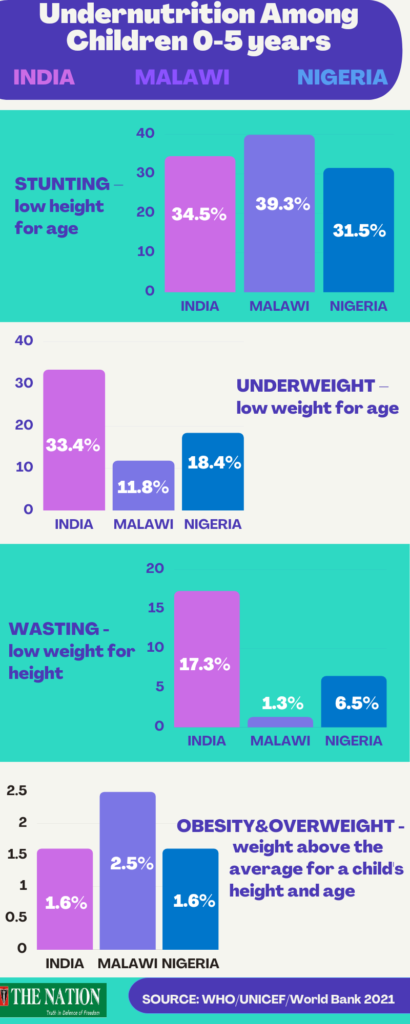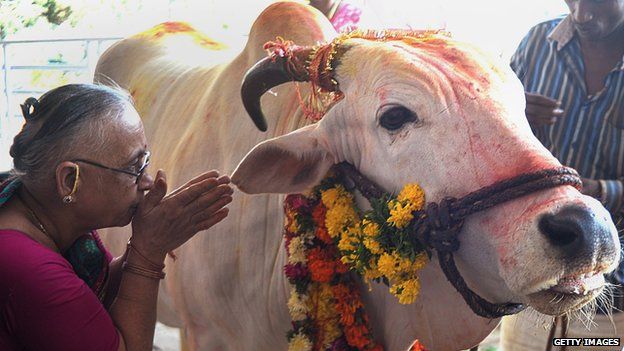By Raphael Mweninguwe (Malawi), Justina Asishana (Nigeria) & Srishti Jaswal (India)

Faith Bikiyere, 6, was admitted to the Nutrition Rehabilitation Unit (NRU) at Mitundu Health Centre in Lilongwe, suffering from stunting, or low weight for height and her mother, Daina Bikiyere, 24, is also undernourished.
Daina says the doctors told her that their conditions are a result of poor diet. Diana explains she followed the advice of some women in her community and her family who told her not to eat certain foods such as okra, catfish, pork, eggs, milk and bananas.
“And when the child was born”, she says, “she was underweight but I was advised by some people not to breastfeed her or give her certain dietary foods.”
This advice is a far cry from UNICEF’s recommendation to breastfeed exclusively for up to six months.
About 3800 kilometers away, in Nigeria, three-year-old Hamisu Garba looks like a one-year-old child as he suffers from wasting (low weight for height). His mother, Ladidi Garba, explained that Hamisu was 16 months old and near death when he was admitted in February to the Severe Acute Malnutrition (SAM) Center at the General Hospital in Minna, Niger State.

“I never knew that the food I was told not to give to him, which included eggs and milk, were the ones affecting him”, she said.
Food taboos, based on cultural and religious beliefs, are impacting negatively on the health of pregnant women and children.
Studies have shown that pregnant women and children often suffer malnutrition because these beliefs prevent them from eating nutritious foods packed with vitamins and proteins. Poor weaning practices further compound the problem
Statistics show that 37.1% of children under five years are stunted in Malawi, 32% in Nigeria and 35.5% in India. (See infographic)
According to UNICEF, nearly half of all deaths in children under 5 are attributable to undernutrition; undernutrition puts children at greater risk of dying from common infections, increases the frequency and severity of such infections, and delays recovery.

UNICEF further states that although stunting has declined steadily since 2000, faster progress is needed to reach the 2030 target while wasting persists at alarming rates and overweight will require a reversal in trajectory if the 2030 target is to be achieved.
Food Taboo as a Religious and Cultural Belief
Food taboos are not only limited to Malawi or Nigeria but are quite common in other African and Asia countries, like India.
In India, Hindus consider a cow a holy animal. Eating beef, as well as drinking clarified butter, milk and other dairy products are taboos. Upper caste Hindus, believe that eating onions and garlic leads to unholy behaviour.
A practising Muslim considers it taboo to eat pork. In Malawi, among the Zion City Church, Zion Christian Church and Apostolic Church, eating pork, catfish, seafood, rabbit and duck are taboos.
Chancy Lutere, a leader of Zion Christian Church, says eating such foods is against their religious beliefs pointing out that both the Bible and the Koran are very clear about what kind of food to eat.

Religious leaders argue that there are alternative foods that can be consumed to supplement the dietary needs of a person.
In Minna, Nigeria, Ladidi says that within her community, exclusive breastfeeding is culturally not encouraged. Giving children eggs, milk, tea and sometimes meat is believed to impact negatively on their lives.
“When I gave birth to my son, I was told not to do exclusive breastfeeding with him. In Magama, we do not give our children eggs because we believe that eating eggs will turn them into thieves and everyone wants their children to do well. I did it because I felt it was the best for them,” Ladidi explains.
A 2019 study among teen mothers in Malawi showed correlations “between dietary diversity and improved pregnancy outcomes including a protective effect against low birth weight”.
A study published in 2021 in India concerning the gaps and barriers in maternal diets found that between 62-82% of Indian mothers believe that various fruits, vegetables along with meat, fish and eggs should not be consumed during pregnancy because these are head-producing in nature and consequently lead to miscarriage and fetal malformations.
In Nigeria, a research, “Food taboos and myths in South-Eastern Nigeria: “The belief and practice of mothers in the region” published in 2016 by Uchenna Ekwochi et al, points out that food taboos contribute to unhealthy nutritional practices during pregnancy and early childhood are detrimental to the child’s growth and development.
The study showed that two in every ten pregnant women in South-East Nigeria avoid eggs, snails and bush meat during their pregnancy which most of them began eating after they give birth.
At the SAM Center in Minna, 15 cases of malnutrition are reported each month among women and children under five years.
Aisha Abdullahi, a health worker at SAM Center, explains that some of the patients brought to the centre are often weak and sometimes do not willingly go along with the meal plan provided However, they follow the plan when told they will die if they don’t follow a recommended dietary plan.
Children like Hamisu and Faith show improvement after a few weeks on the recommended diets.
The staff interviewed say lack of education and ignorance coupled with poverty and cultural beliefs are the driving force of malnutrition.
Impact of food taboos on the health of mothers and children
Dr Mary Shawa, a Nutritionist in Malawi says non-consumption of foods high in nutrients coupled with the belief that having a reduced meal frequency “will help to have a smaller baby who will be easier to deliver” is causing malnutrition.
She says children who are restricted from taking foods such as eggs, fish, pork, and beef result in protein-calorie malnutrition, maternal depletion, premature ageing, and general malnutrition in women.
Hajiya Asmau Mohammed, the Niger State Nutrition Officer, noted that the state has lots of farming and food, “but misconceptions and taboos prevent people from getting optimal nutrition.”
Finding solutions
An innovation of setting up Kitchen Corners at the Hospitals and Primary Healthcare Centers across the Niger State in Nigeria are helping to end malnutrition where women are taught how to prepare different kinds of nutritious foods.
Having vegetable gardens in one’s backyard is also part of the solution. And some experts have proposed 8 antenatal visits for pregnant women to have additional nutrition education.
Outreach programmes on community radio stations in Malawi such as Ulyelo Wamapha translated as ‘Good Eating’ on Chirundu Community Radio Station provide listeners with nutrition knowledge. The content is developed by the Malawi government as part of its nutrition insecurity interventions.
Another programme, ‘Foundation for Good Health’ on Madziko Community Radio gives farmers an opportunity to discuss issues about nutrition, health and sanitation. Each radio station has its program on nutrition which helps farmers get educated on eating a good diet.
Studies indicate that several pregnant women and children are dying of malnutrition because of the beliefs that restrict them from eating certain kinds of foods which are nutritious and full of vitamins and proteins.
But such religious and cultural beliefs could be overcome by giving education to pregnant women and lactating mothers during antenatal and postnatal care.
This is why Mohammed stated that increased sensitization is key in changing perceptions of food taboos just as she pointed out that while cultures and traditions are respected, alternatives to the food taboos can be presented to the communities which would improve the nutritional status of women and children and gradually make them embrace the food they are rejecting.

